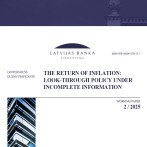Annual inflation reaches a record low since September 2010
The annual inflation in January 2013 continued to drop, benefiting from the favourable effects of both the stable global food prices and the developments in the prices of oil over previous months under whose impact it was possible to slightly reduce the natural gas and thermal energy tariffs. Thus the overall rise of the prices of food and energy was down in January year-on-year and the annual inflation level dropped to its lowest since September 2010 (0.6%). The monthly inflation was substantially reduced not only by the drop in regulated prices (which is not typical for January), but also the sales of seasonal goods (e.g., an atypically big drop, -7.3%, in the wearing apparel and footwear group), and the average consumer price level in Latvia dropped 0.2% month-on-month.
Overall, the impact of supply-side factors on inflation was balanced in January and could remain so in the coming months:
- the impact of the gradual rise in oil prices (observed in US dollars) was limited, as compared to December, by the drop in the value of the US dollar;
- there are no major upheavals in the food and agricultural goods market – according to the UN Food and agriculture organization (FAO), as a result of the expected increased supply, sugar prices continue to drop and the dairy product prices are beginning to stabilize while price rises are resuming in the oil and fats group that was unfavourably affected by the rains in Eastern Asia, giving rise to concerns regarding the harvesting of palm oil harvesting as well as the weather conditions in South America, causing similar worries about the harvesting of soy. Meanwhile, the bad olive harvest in Spain resulting from the drought of previous months, is leaving a comparatively minuscule and local impact, yet could affect the prices of some goods in the region;
- there is some good news in the energy market, moderating the impact of domestic supply factors on inflation: AS "Rīgas siltums" is planning to reduce the heating tariffs in the middle of the year when the thermal plants using bio-fuel in Zasulauks and Ziepniekkalns start operating, favourably impacting the structure of production costs.
The impact of consumption structure changes on the consumer price index (CPI) compared to the weights used in the calculation of 2012 inflation is also being outweighed to a great extent. If the drop in actual consumption resulted in a slight drop in the proportion of thermal energy (i.e. during last year’s heating season the consumption of thermal energy, because of weather conditions, was less than, e.g., during the 2010/2011 heating season) and thus the changes in the prices of thermal energy have a slightly lesser impact on the CPI 2013, in the fuel market, the price factor turned out to be more powerful than the ability to reduce consumption and the proportion of fuel in the CPI basket has increased slightly. Thus, under the conditions of similar price changes, the contribution of these energy resources to CPI could balance out.
With the income level going up gradually, its positive impact is observed on other changes in consumption structure: the proportion of expenditure for food has dropped slightly. Yet it has apparently acted to increase the proportion of expenditure for catering services and also allows for more expenditure directed for recreation and culture – expenditure that dropped substantially in the CPI structure of 2010.-2012.
No impact from the demand-side is observed on inflation and the average level of 2013 inflation in all likelihood will be lower than last year and will not exceed 2.0% - in part as a result of base factors (e.g., the dynamic of foodstuff and energy resource prices compared to what it was in some months of last year) and in part because of expected slightly slower economic growth.
Textual error
«… …»






